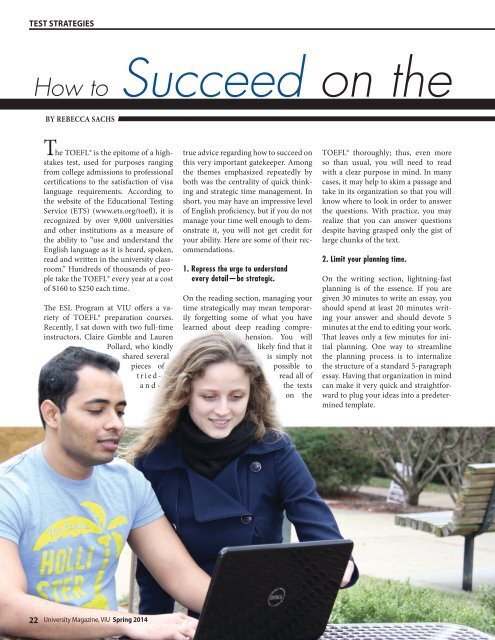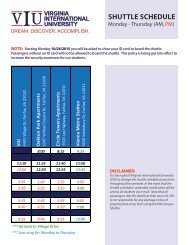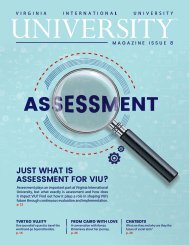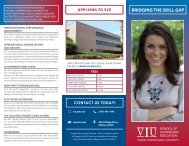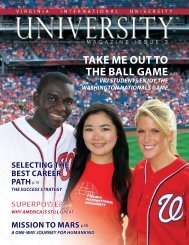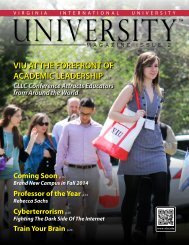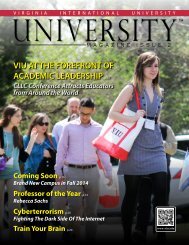University Magazine Issue 1
Create successful ePaper yourself
Turn your PDF publications into a flip-book with our unique Google optimized e-Paper software.
TEST STRATEGIES<br />
How to<br />
Succeed on the<br />
BY REBECCA SACHS<br />
The TOEFL® is the epitome of a highstakes<br />
test, used for purposes ranging<br />
from college admissions to professional<br />
certifications to the satisfaction of visa<br />
language requirements. According to<br />
the website of the Educational Testing<br />
Service (ETS) (www.ets.org/toefl), it is<br />
recognized by over 9,000 universities<br />
and other institutions as a measure of<br />
the ability to “use and understand the<br />
English language as it is heard, spoken,<br />
read and written in the university classroom.”<br />
Hundreds of thousands of people<br />
take the TOEFL® every year at a cost<br />
of $160 to $250 each time.<br />
The ESL Program at VIU offers a variety<br />
of TOEFL® preparation courses.<br />
Recently, I sat down with two full-time<br />
instructors, Claire Gimble and Lauren<br />
Pollard, who kindly<br />
shared several<br />
pieces of<br />
tried-<br />
and-<br />
true advice regarding how to succeed on<br />
this very important gatekeeper. Among<br />
the themes emphasized repeatedly by<br />
both was the centrality of quick thinking<br />
and strategic time management. In<br />
short, you may have an impressive level<br />
of English proficiency, but if you do not<br />
manage your time well enough to demonstrate<br />
it, you will not get credit for<br />
your ability. Here are some of their recommendations.<br />
1. Repress the urge to understand<br />
every detail—be strategic.<br />
On the reading section, managing your<br />
time strategically may mean temporarily<br />
forgetting some of what you have<br />
learned about deep reading comprehension.<br />
You will<br />
likely find that it<br />
is simply not<br />
possible to<br />
read all of<br />
the texts<br />
on the<br />
TOEFL® thoroughly; thus, even more<br />
so than usual, you will need to read<br />
with a clear purpose in mind. In many<br />
cases, it may help to skim a passage and<br />
take in its organization so that you will<br />
know where to look in order to answer<br />
the questions. With practice, you may<br />
realize that you can answer questions<br />
despite having grasped only the gist of<br />
large chunks of the text.<br />
2. Limit your planning time.<br />
On the writing section, lightning-fast<br />
planning is of the essence. If you are<br />
given 30 minutes to write an essay, you<br />
should spend at least 20 minutes writing<br />
your answer and should devote 5<br />
minutes at the end to editing your work.<br />
That leaves only a few minutes for initial<br />
planning. One way to streamline<br />
the planning process is to internalize<br />
the structure of a standard 5-paragraph<br />
essay. Having that organization in mind<br />
can make it very quick and straightforward<br />
to plug your ideas into a predetermined<br />
template.<br />
22 <strong>University</strong> <strong>Magazine</strong>, VIU Spring 2014


